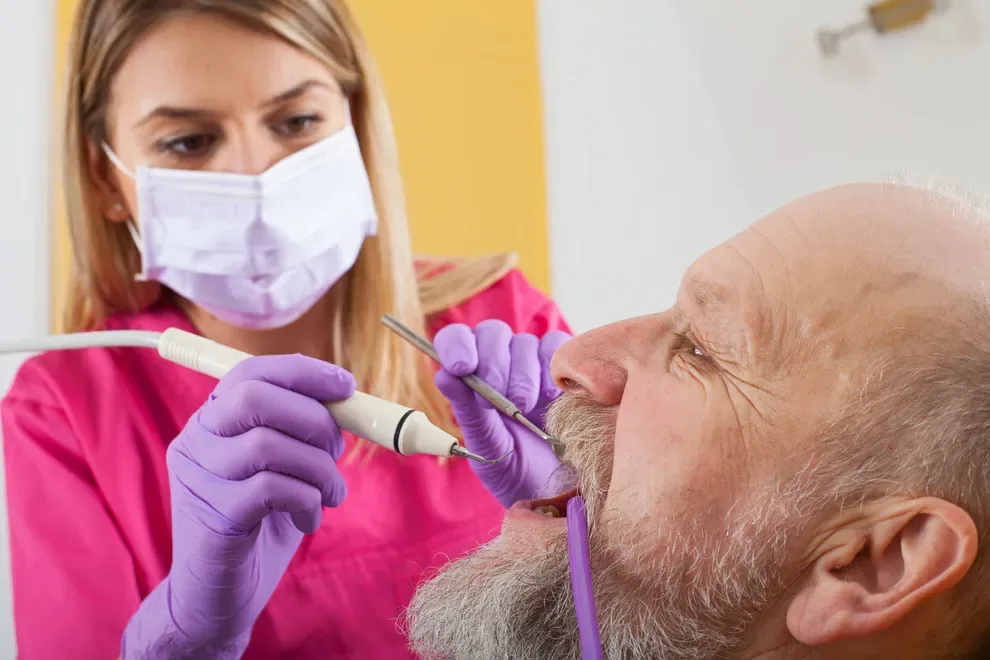The Link Between Alzheimer’s & Gum Disease

Table of Contents
- About Gum Disease
- Alzheimer’s & Bacteria in the Mouth
- Gum Disease & Alzheimer's Progression
- Preventing Gum Disease
Bacteria in the mouth does not just impact gum tissue. The imbalance of oral bacteria can become a risk factor for Alzheimer’s disease.
Alzheimer’s disease typically impacts older adults and can cause a decline in cognitive functioning. Brushing and flossing your teeth regularly can help to prevent this bacterial buildup.
Gum disease, or periodontal disease, occurs when bacteria in the mouth (plaque) builds up and hardens to tartar on your teeth, causing an infection in the gum tissue. Chronic gum disease can cause pockets of bacteria to settle in the gum tissue. It can lead to tooth decay and loss, pain, and bleeding gums.
Gum Disease
Gum disease is one of the biggest issues surrounding oral health in adults. Nearly half of people ages 30 and older have some form of it, and close to three quarters of adults ages 65 and older have a form of gum disease.1 Gum disease is common and becomes even more common as we age.
In its early stages, gum disease is called gingivitis, and it can be reversed with professional teeth cleaning and proper oral hygiene.
Gum disease is caused by bacteria building up in the mouth after eating and drinking. This bacterium sticks to the teeth in the form of plaque. If it is not removed, it can harden into tartar that will require a dental professional to remove.
Failure to brush and floss regularly, as well as neglecting routine professional teeth cleanings, can lead to gum disease. One of the biggest risk factors for gum disease is smoking. Additional risk factors include the following:2
Diabetes
Hormonal changes in women
Medications that cause less saliva to be present
Illness
Genetics
Advanced gum disease is called periodontal disease. It can cause redness, swelling, and pain in the gum tissue as well as bleeding and even potentially tooth loss.
Gum disease is treatable with professional cleanings. It may require deep cleanings, such as scaling and root planing, to fully clear it.
Alzheimer’s & Bacteria in the Mouth
Alzheimer’s disease is a form of dementia that impacts parts of the brain involved in memory, language, and thought. It can severely inhibit a person’s ability to carry out day-to-day tasks.
Alzheimer’s disease typically impacts older adults. Around one out of every nine adults ages 65 and older is affected. Currently, there is no known direct cause, but there are many suspected risk factors for the disease.
One of these risk factors is gum disease. Studies show that oral bacteria present in chronic gum disease are associated with the development of dementia, including Alzheimer’s disease.3
When studying the brains of Alzheimer’s patients, scientists have found the main pathogen present in chronic periodontal disease, Porphyromonas gingivalis, is also present.4 These bacteria are neurotoxic, meaning that they negatively affect cognitive functioning.
Gum Disease & the Progression of Alzheimer’s
Harmful bacteria in the mouth may be a potential risk factor for developing Alzheimer’s disease and dementia.
Bacteria in the mouth is normal. Our mouths are full of bacteria, and not all of it is bad. When you have chronic gum disease, there is an imbalance in the levels of bacteria, and the bad can outnumber the good.
Healthy levels of oral bacteria can help to keep inflammation in the brain down. This, in turn, reduces the risk for Alzheimer’s disease. The bacterial imbalance can then be associated with the onset of Alzheimer’s disease.
There are two main proteins in the brain that are present with Alzheimer’s disease: amyloid tau and beta. The amyloid beta protein is a marker for Alzheimer’s that has been found to be present in people with chronic gum disease and unhealthy levels of oral bacteria.
Preventing Gum Disease
There is no specific known cause for Alzheimer’s disease, but there are risk factors, and chronic gum disease can be one of them. Keeping your mouth healthy protects your teeth, gums, and oral health, and it can also help to minimize the odds for dementia and cognitive decline.
These are some of the best ways to help prevent gum disease:5
Brush your teeth at least two times per day for two minutes at a time.
Use a soft-bristled toothbrush and a non-abrasive fluoride toothpaste.
Do not smoke or use tobacco products.
Floss daily.
Use mouthwash.
Talk to your dentist about potential risk factors.
Schedule routine professional dental cleanings as often as recommended by a dental professional.
In its early stages, gum disease is completely reversible. It can be managed with professional dental cleanings and good oral hygiene.
Once tartar is present on the teeth and under the gumline, it can only be removed by a dental professional. You may require more frequent professional teeth cleanings if you are at risk for chronic gum disease. Your dentist can develop a cleaning schedule and care plan that will keep your mouth — and your brain — safe from unhealthy levels of bacteria.
